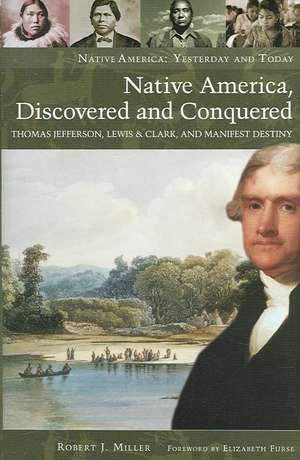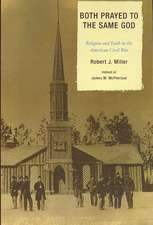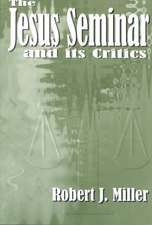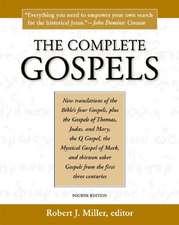Native America, Discovered and Conquered: Thomas Jefferson, Lewis & Clark, and Manifest Destiny: Native America: Yesterday and Today
Autor Robert J. Milleren Limba Engleză Hardback – 29 sep 2006 – vârsta până la 17 ani
| Toate formatele și edițiile | Preț | Express |
|---|---|---|
| Paperback (1) | 108.85 lei 43-57 zile | |
| BISON BOOKS – 30 iun 2008 | 108.85 lei 43-57 zile | |
| Hardback (1) | 321.93 lei 43-57 zile | |
| Bloomsbury Publishing – 29 sep 2006 | 321.93 lei 43-57 zile |
Preț: 321.93 lei
Preț vechi: 392.22 lei
-18% Nou
Puncte Express: 483
Preț estimativ în valută:
61.60€ • 64.48$ • 51.27£
61.60€ • 64.48$ • 51.27£
Carte tipărită la comandă
Livrare economică 31 martie-14 aprilie
Preluare comenzi: 021 569.72.76
Specificații
ISBN-13: 9780275990114
ISBN-10: 0275990117
Pagini: 240
Dimensiuni: 156 x 235 x 25 mm
Greutate: 0.52 kg
Editura: Bloomsbury Publishing
Colecția Praeger
Seria Native America: Yesterday and Today
Locul publicării:New York, United States
ISBN-10: 0275990117
Pagini: 240
Dimensiuni: 156 x 235 x 25 mm
Greutate: 0.52 kg
Editura: Bloomsbury Publishing
Colecția Praeger
Seria Native America: Yesterday and Today
Locul publicării:New York, United States
Notă biografică
Robert J. Miller is Faculty Director, Rosette LLP, American Indian Economic Development Program, Sandra Day O'Connor College of Law, Arizona State University and Chief Justice, Court of Appeals, Confederated Tribes of the Grand Ronde Community of Oregon. He is a citizen of the Eastern Shawnee Tribe of Oklahoma.
Cuprins
Series ForewordForeword by Elizabeth FurseAcknowledgmentsPrefaceIntroduction1. The Doctrine of Discovery2. The Doctrine of Discovery in America3. Thomas Jefferson and the Doctrine of Discovery4. Thomas Jefferson, Manifest Destiny, and the Indian Nations5. Lewis and Clark and Discovery6. Manifest Destiny and Discovery7. The United States' Exercise of Discovery against the Indian Nations, 1774-2005ConclusionNotesSelected BibliographyIndex
Recenzii
In rationales for the invasion of the Americas, one legal instrument stands out in high relief: Europe's so-called Doctrine of Discovery. In the first third of the 19th century, it morphed into the purely US doctrine of Manifest Destiny. Modern US historians know this much, but nearly none know the legal complexity or sweep of these ideas. When they are laid shockingly bare, as in Miller's important book, they are quickly seen to have been both idiotic and revered. Americans easily grasped the Doctrine of Discovery's ten legalisms for land seizure and incidental genocide before the 20th century, with the later Manifest Destiny dashing even the pretense of Native rights. Miller walks readers through deep, consistent evidence that Thomas Jefferson patterned his Louisiana expansionism upon the legal pretexts of discovery, setting up removal in the process. Miller carefully traces the racist, greedy religiosity of Manifest Destiny next used to seize Indian land, especially in Oregon, showing it also as the basis for laws applied to Native Americans that appallingly continue in effect into the present. A must read. Essential. All libraries serving students of any period of US history.
This is an easy-to-read, informative, and well-researched book. Miller manages to describe a complex international doctrine in layman terms and keep the readers' interest along the way. It will be enjoyed by those studying legal, U.S. or Native American history.
This history has been examined thoroughly by previous scholars; what Miller adds to the discussion is a thorough study of Jefferson's infatuation with the principle and a determination to link doctrine of discovery to the emergence of the American belief in Manifest Destiny..Miller's thoroughly researched and determined argument is significant for at least three other reasons. First, he points out that the doctrine of discovery was not only the foundation of American territorial and political hegemony over our nation's indigenous peoples, but that it is a living, breathing principle that courses through contemporary American Indian law and political calculations. Second, the book complements an important and expanding historiography on the ideology and cant of Euro-American conquest. Finally, Miller does not simply lament the tragedies wrought by the doctrine of discovery; he offers the United States an honorable way out of the legal miasma produced by two centuries of adherence to the doctrine
[T]akes a fresh approach in placing the discovery doctrine at the center of analysis of the Lewis and Clark expedition, and he proves an interesting discussion of the explorers' use of rituals and symbols that echoed earlier European practices..[M]iller's legal insights provide a useful contribution to scholarship on Jefferson, Lewis and Clark, the Louisiana Purchase, the Pacific Northwest, American expansionism, and U.S. Indian policy.
[P]ersuasive in making his case that a central legal ideology played a crucial role in justifying American assertions of jurisdiction over western territory and Native peoples. Miller convincingly demonstrates that Jefferson understood and applied elements of the doctrine of discovery in the late eighteenth and early nineteenth centuries..[M]iller's legal insights provide a useful contribution to scholarship on Jefferson, Lewis and Clark, the Louisiana Purchase, the Pacific Northwest, American expansionism, and U.S. Indian policy.
Robert Miller, in his voluminous work Native America, Discovered and Conquered, very ably and methodically deconstructs the winking inexorableness that permeates narrative history of the American West. In a wholly new and focused voice, Miller traces the Doctrine of Discovery from its European roots through to its present-day ramifications on the land tenure of Native American tribes and resource scarcity issues in the West..What makes Miller's Native America such a compelling read is not only his unique style but also his commitment to original scholarly legal research..To say this book is required reading for those wishing to understand American history is an understatement. Robert Miller has provided an opportunity for readers with varying interests..[t]o gain valuable insight into the interconnected web of religion, conquest, human rights, land and equity..This is an important time for this book to be published, and one can hope that it will be well read.
To say this book is required reading for those wishing to understand American history is an understatement. Miller has provided an opportunity for readers with varying interests from Constitutional law professor to tribal advocate to public lands users of all types to gain valuable insight into the interconnected web of religion, conquest, human rights, land and equity. One comes away from reading Miller's Native America with a meaningful sense of how irresponsible, and illusory, a folly it is to allow a sense of Providence to blindly guide such things as constitutionally protected rights, domestic and foreign policy with other nations and the relationship and dominion over Nature and other nonbelievers. This is an important time for this book to be published, and one can hope that it will be well read.
Former Oregon Congresswoman Elizabeth Furse introduces the shocking neglect of Indian issues and laws by members of Congress and the education system. As a member of the Eastern Shawnee Tribe and Chief Justice, Court of Appeals, Confederated Tribes of the Grande Ronde Community of Oregon, Miller, notes the book's conception out of ambivalence over the bicentennial anniversary of the Lewis and Clark expedition. He traces how the Doctrine of Discovery still continues to limit Native rights and calls for its end.
In recent decades, scholars have reshaped our understanding of conquest, and as a result the idea of conquest is an unsettling one. Robert J. Miller's original and important work should launch a similar transformation for the idea of discovery. . . . Whether or not historians agree with Miller's analysis of westward expansion, they must now address the Doctrine of Discovery and reckon with his aggressive arguments and compelling conclusions.
This is an easy-to-read, informative, and well-researched book. Miller manages to describe a complex international doctrine in layman terms and keep the readers' interest along the way. It will be enjoyed by those studying legal, U.S. or Native American history.
This history has been examined thoroughly by previous scholars; what Miller adds to the discussion is a thorough study of Jefferson's infatuation with the principle and a determination to link doctrine of discovery to the emergence of the American belief in Manifest Destiny..Miller's thoroughly researched and determined argument is significant for at least three other reasons. First, he points out that the doctrine of discovery was not only the foundation of American territorial and political hegemony over our nation's indigenous peoples, but that it is a living, breathing principle that courses through contemporary American Indian law and political calculations. Second, the book complements an important and expanding historiography on the ideology and cant of Euro-American conquest. Finally, Miller does not simply lament the tragedies wrought by the doctrine of discovery; he offers the United States an honorable way out of the legal miasma produced by two centuries of adherence to the doctrine
[T]akes a fresh approach in placing the discovery doctrine at the center of analysis of the Lewis and Clark expedition, and he proves an interesting discussion of the explorers' use of rituals and symbols that echoed earlier European practices..[M]iller's legal insights provide a useful contribution to scholarship on Jefferson, Lewis and Clark, the Louisiana Purchase, the Pacific Northwest, American expansionism, and U.S. Indian policy.
[P]ersuasive in making his case that a central legal ideology played a crucial role in justifying American assertions of jurisdiction over western territory and Native peoples. Miller convincingly demonstrates that Jefferson understood and applied elements of the doctrine of discovery in the late eighteenth and early nineteenth centuries..[M]iller's legal insights provide a useful contribution to scholarship on Jefferson, Lewis and Clark, the Louisiana Purchase, the Pacific Northwest, American expansionism, and U.S. Indian policy.
Robert Miller, in his voluminous work Native America, Discovered and Conquered, very ably and methodically deconstructs the winking inexorableness that permeates narrative history of the American West. In a wholly new and focused voice, Miller traces the Doctrine of Discovery from its European roots through to its present-day ramifications on the land tenure of Native American tribes and resource scarcity issues in the West..What makes Miller's Native America such a compelling read is not only his unique style but also his commitment to original scholarly legal research..To say this book is required reading for those wishing to understand American history is an understatement. Robert Miller has provided an opportunity for readers with varying interests..[t]o gain valuable insight into the interconnected web of religion, conquest, human rights, land and equity..This is an important time for this book to be published, and one can hope that it will be well read.
To say this book is required reading for those wishing to understand American history is an understatement. Miller has provided an opportunity for readers with varying interests from Constitutional law professor to tribal advocate to public lands users of all types to gain valuable insight into the interconnected web of religion, conquest, human rights, land and equity. One comes away from reading Miller's Native America with a meaningful sense of how irresponsible, and illusory, a folly it is to allow a sense of Providence to blindly guide such things as constitutionally protected rights, domestic and foreign policy with other nations and the relationship and dominion over Nature and other nonbelievers. This is an important time for this book to be published, and one can hope that it will be well read.
Former Oregon Congresswoman Elizabeth Furse introduces the shocking neglect of Indian issues and laws by members of Congress and the education system. As a member of the Eastern Shawnee Tribe and Chief Justice, Court of Appeals, Confederated Tribes of the Grande Ronde Community of Oregon, Miller, notes the book's conception out of ambivalence over the bicentennial anniversary of the Lewis and Clark expedition. He traces how the Doctrine of Discovery still continues to limit Native rights and calls for its end.
In recent decades, scholars have reshaped our understanding of conquest, and as a result the idea of conquest is an unsettling one. Robert J. Miller's original and important work should launch a similar transformation for the idea of discovery. . . . Whether or not historians agree with Miller's analysis of westward expansion, they must now address the Doctrine of Discovery and reckon with his aggressive arguments and compelling conclusions.



























